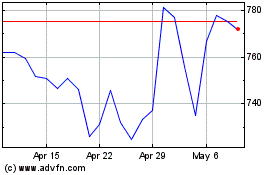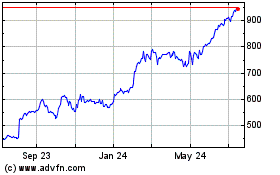Eli Lilly Asks FDA to Authorize Covid-19 Antibody Drug--Update
October 07 2020 - 10:23AM
Dow Jones News
By Peter Loftus
Eli Lilly & Co. said it has requested U.S. authorization of
the emergency use of an experimental antibody-based treatment for
people with recently diagnosed, mild-to-moderate Covid-19,
following positive results from clinical testing.
The Indianapolis-based company said it is seeking the
authorization for its drug, code named LY-CoV555, which was derived
from a blood sample of one of the earliest U.S. survivors of
Covid-19.
If cleared, it could be the first to treat less severe cases of
Covid-19. The few other therapies authorized for Covid-19
treatment, including remdesivir from Gilead Sciences Inc., target
hospitalized patients with more serious cases.
Lilly's antibody drug could also be the first in a new class of
Covid-19 agents that could not only provide treatment but also
potentially give temporary protection against the virus to people
at risk of infection. That would fill a gap until vaccines are
authorized.
The leading experimental antibody drugs have shown enough
promise in testing so far that President Trump was given one
developed by Regeneron Pharmaceuticals Inc.
Lilly said last month its drug reduced the rate of
hospitalization compared with a placebo in a study.
The Indianapolis company is manufacturing doses and could have
100,000 doses this month and as many as one million by the end of
the year.
Antibody treatments are meant to mimic the human immune system's
own agents that can neutralize the new coronavirus.
The Lilly antibody, LY-CoV555, came from a collaboration between
Lilly and AbCellera Biologics Inc., of Vancouver, Canada. AbCellera
isolated antibodies from a blood sample taken from one of the first
people in the U.S. to recover from Covid-19. The antibody therapy
is essentially a clone of one of those antibodies.
In August, Lilly started a study in nursing homes, testing
whether LY-CoV555 could reduce the rate of infection and disease
among vulnerable residents and staff after a case had been
diagnosed at the facility.
Lilly also said a new study showed that combining LY-CoV555 with
another antibody reduced viral load, symptoms and hospitalizations
in Covid-19 patients, compared with a placebo. The rate of
Covid-19-related hospitalization and emergency-room visits was 0.9%
among those who received the combination therapy, compared with
5.8% in the placebo group.
The company expects to seek emergency-use authorization for the
combination in November.
The second antibody in the combination therapy, LY-CoV016, came
from a partnership with Junshi Biosciences, of China. Each antibody
targets a different region of the spike protein that is found on
the surface of the new coronavirus.
The company also is in discussions with regulators outside the
U.S. to potentially approve the use of its single and combination
antibody therapies.
Lilly said it expects to make 50,000 doses of the combination
therapy this year, and that supply would increase substantially
early next year. Lilly recently formed a collaboration with Amgen
Inc. to help manufacture antibodies, and Lilly said Wednesday it
would pursue additional partnerships to provide the treatments to
resource-limited countries.
Write to Peter Loftus at peter.loftus@wsj.com
(END) Dow Jones Newswires
October 07, 2020 10:08 ET (14:08 GMT)
Copyright (c) 2020 Dow Jones & Company, Inc.
Eli Lilly (NYSE:LLY)
Historical Stock Chart
From Mar 2024 to Apr 2024

Eli Lilly (NYSE:LLY)
Historical Stock Chart
From Apr 2023 to Apr 2024
